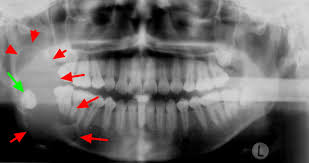+919790726189

This is your website preview.
Currently it only shows your basic business info. Start adding relevant business details such as description, images and products or services to gain your customers attention by using Boost 360 android app / iOS App / web portal.
WISDOM TOOTH SURGERY AT ASHOK NAGAR WEST MAMBAL...

WISDOM TOOTH SURGERY AT ASHOK NAGAR WEST MAMBALAM CHENNAI Understanding Horizontal Impaction: Causes, Symptoms, and Treatment Wisdom teeth, or third molars, are the last set of teeth to emerge, usually between the ages of 17 and 25. While some people experience no issues with their wisdom teeth, many face complications due to insufficient space in the jaw. One such complication is horizontal impaction, a condition where the wisdom tooth grows sideways instead of erupting normally. What is Horizontal Impaction? Horizontal impaction occurs when a wisdom tooth is positioned at a 90-degree angle, growing parallel to the jawbone and adjacent teeth. Unlike vertical impaction, where the tooth remains upright but trapped under the gum, a horizontally impacted tooth exerts pressure on neighboring teeth, leading to various oral health problems. Causes of Horizontal Impaction Several factors contribute to horizontal impaction, including: Lack of Space: A small or overcrowded jaw often prevents the wisdom tooth from emerging properly. Genetics: Family history plays a role in dental development, including impactions. Delayed Eruption: If wisdom teeth fail to emerge at the right time, they may shift into an abnormal position. Improper Tooth Alignment: The natural angulation of teeth can also lead to an impacted position. Symptoms of Horizontally Impacted Wisdom Teeth While some cases remain asymptomatic, horizontally impacted teeth can cause significant discomfort and dental issues, such as: Severe Pain and Jaw Stiffness: The pressure exerted on neighboring teeth can lead to persistent pain and restricted jaw movement. Swelling and Redness: Gum inflammation around the impacted area is common. Difficulty in Chewing: The misaligned tooth can affect normal chewing and biting. Bad Breath and Infection: Trapped food and bacterial buildup around the partially erupted tooth can lead to pericoronitis (gum infection). Cyst Formation: In rare cases, an untreated impacted tooth can develop into a cyst, damaging the jawbone and surrounding teeth. Diagnosis and Treatment A dentist diagnoses horizontal impaction through clinical examination and X-rays, which help determine the tooth’s exact position. Based on the severity, treatment options include: 1. Observation and Monitoring If the impacted tooth is not causing any discomfort or dental problems, the dentist may recommend regular monitoring. 2. Surgical Extraction In most cases, a horizontally impacted wisdom tooth requires surgical extraction. The procedure involves making an incision in the gum, removing the tooth in sections, and closing the site with sutures. Local or general anesthesia is administered to ensure a painless experience. 3. Pain Management and Aftercare Post-extraction care is crucial for proper healing. Patients should follow these guidelines: Take prescribed painkillers and antibiotics. Apply cold packs to reduce swelling. Avoid smoking, drinking through straws, and eating hard foods. Maintain good oral hygiene while avoiding the surgical site. Conclusion A horizontally impacted wisdom tooth can lead to severe pain, infections, and dental complications if left untreated. Early diagnosis and timely intervention are essential for preventing long-term damage. If you suspect an impacted wisdom tooth, consult a dentist for an appropriate treatment plan to maintain optimal oral health. Dental Clinics in West Mambalam Dentists in West Mambalam Dentists in Ashok Nagar Best dentist near me Best Dental Clinics in West Mambalam Oral surgeon in West Mambalam Dental Implants in West Mambalam Oral surgeon in Ashok Nagar

